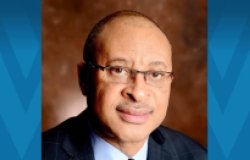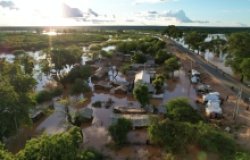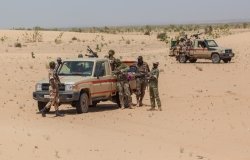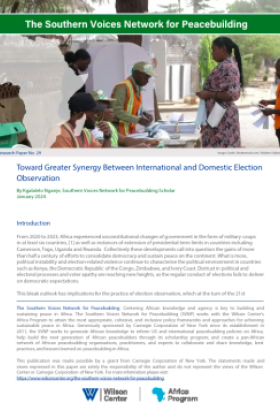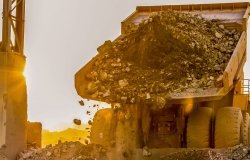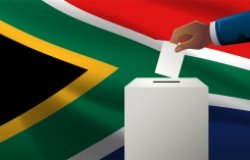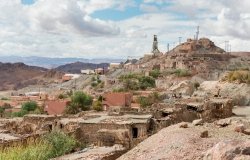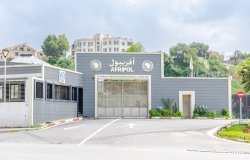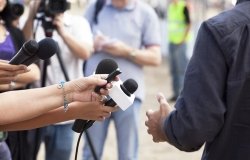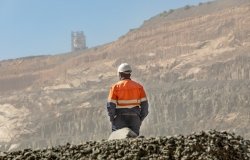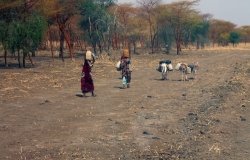Can the Obama machine be replicated in Kenya and Africa?
OSI Public Policy Scholar Maina Kiai discusses the American elections and their implications for elections in Africa.
Overview
OSI Africa Program Public Policy Scholar Maina Kiai began his May 15 presentation by asserting that Africa is currently facing a major crisis of leadership. In the roughly forty years of African independence, true leaders have been few and far between. This is not from a lack of politicians or because of a lack of political capacity, Kiai said. Rather, Africa seems to attract the worst of the worst of the political world, and the problem might lie in the way Africans do politics. When the Obama machine was put into motion in the United States and Obama started to express his will to change politics, to change the way Americans do politics, Kiai began to think that Africans could possibly reconceptualize their political system as well.
To a large extent, those involved in democratic movements and democracy promotion in Africa focus their attention on a top-down approach, wanting to change policy, laws, constitutions, structures and systems. This is a good approach, but not sufficient. Often forgotten or left aside is the role of the individual. Structures and systems cannot be built without the right people to do so; people themselves are as important as the structures and systems they are a part of. The general experience of constitution reform in African societies is very telling: Existing leaders do not want constitutions to change or to be reformed. They do not want a new way of doing things.Kiai underlined, however, that a society cannot be based solely on individuals and individual will. The personality cult enjoyed by several African leaders is not the solution either. Indeed, there is a need to find the right people pushing toward reform, which is where Obama became so important. He has been able to organize and articulate his vision for American and international politics, and equally as important, he has been able to give people hope. He galvanized and mobilized people, giving them hope for a different kind of politics.
According to Kiai, there are three features of Obama's campaign that should be acknowledged and learned by African politicians. Firstly, Obama demonstrated a very high level of political organization and personal engagement with the campaign. After losing the primaries in New Hampshire he initiated contact, every other day, with all State directors. He took more control of the machine than he previously had. Trainings and workshops were offered to volunteers before joining the campaign, and all staff members were required to train as volunteers before being hired full time. Secondly, Obama rallied a huge number of people to his campaign, and numbers do matter. To attract members of his campaign, Obama resorted to all available communication tools, including an unprecedented use of the internet and different social networking tools. Lastly, Obama himself is a different kind of politician. Comparing him to Nelson Mandela, Kiai said that an "Obama" only comes once in a lifetime. His personality is an important part of his success, not only because he is smart but also because he did not strive for the presidency for reasons of personal gain. This has a big impact on how a politician is perceived, and consequently on how effective they are in office.Replicating the Obama machine
Kiai said that the different political personalities in Kenya and Africa as a whole do not embody the qualities and features present in the Obama administration or campaign, however, it may be possible to identify many people that could collectively replicate Obama's strengths. Leaders should be a source of hope for their populations. Once this hope is lost, there is little left to work for, said Kiai.
African countries need to find a way to bring together the different aspects present in the Obama campaign and administration; Kiai focused on several things he deemed most important.
Africa is changing; but the leadership is lagging behind, and people are ready for drastic transformation. But there seems to be a real gap between frustrations that people articulate and how people choose to vote. In other words, peoples' political, social and economic desires do not necessarily influence voting trends. This is an important gap that civil society needs to close. Civil society organizations have the capacity to help people realize that they do have political agency, and can voice their opinions within existing political mechanisms. Systems of ethnic patronage and other forms of political manipulation must change, and the predominance of ethnic ties in politics must be challenged; much of this work must be done at a grass roots level. Both civil society and political leaders need to start training people on non-violent and non-archaic civic action to empower populations to participate in their country's political processes.
In addition, communication tools are essential. The internet is of particular importance in the US because the country is very well wired. This not the case in Africa; however, the continent does have blooming television and radio capabilities. While they are used mostly for entertainment more than for education, TV and radio should and could be an alternative to the internet in Africa. Different varieties of programming can be used more systematically as a rallying point to link Africans. In this process, political accountability needs to be maintained or restored: public solutions must be found to public problems and not private solutions to public problems, as it is too often the case. African politicians need to focus on and identify these sorts of opportunities. Timing, however, is critical. Obama recognized before anyone else that Americans and American politics have changed, and in seizing this window of opportunity, he was able to run an effective campaign based on tenets of change and progress.
Kiai said it will be hard to move away from an individualist, highly executive-oriented presidential system in Africa. Societies are accustomed to this, but the potential is there for a paradigm shift. The most urgent situation now is that Kenya is on the precipice; the country threatens to fall into conflict. Corruption is rampant; many politicians are stockpiling money in anticipation of the next elections, instead of injecting it into the Kenyan economy. Politicians are not delivering; they are just interested in power. Frustrations on the ground are enormous, as evidenced by weekly protests over the past few months. Discontent is real and quite evident.
Of particular interest to Kiai is how the Obama machine will evolve over the course of the presidency. The processes that elect a president are not sufficient to deliver on campaign promises. The question thus remains, how will Obama's electoral machine translate into an effective presidential administration, and will this system influence future African elections.
Documents & Downloads
Hosted By

Africa Program
The Africa Program works to address the most critical issues facing Africa and US-Africa relations, build mutually beneficial US-Africa relations, and enhance knowledge and understanding about Africa in the United States. The Program achieves its mission through in-depth research and analyses, public discussion, working groups, and briefings that bring together policymakers, practitioners, and subject matter experts to analyze and offer practical options for tackling key challenges in Africa and in US-Africa relations. Read more
Thank you for your interest in this event. Please send any feedback or questions to our Events staff.

